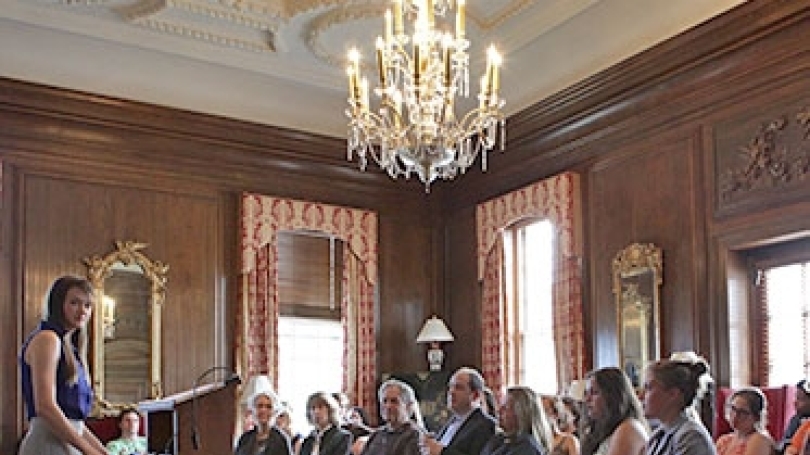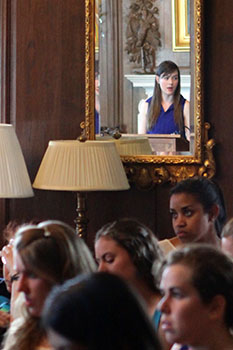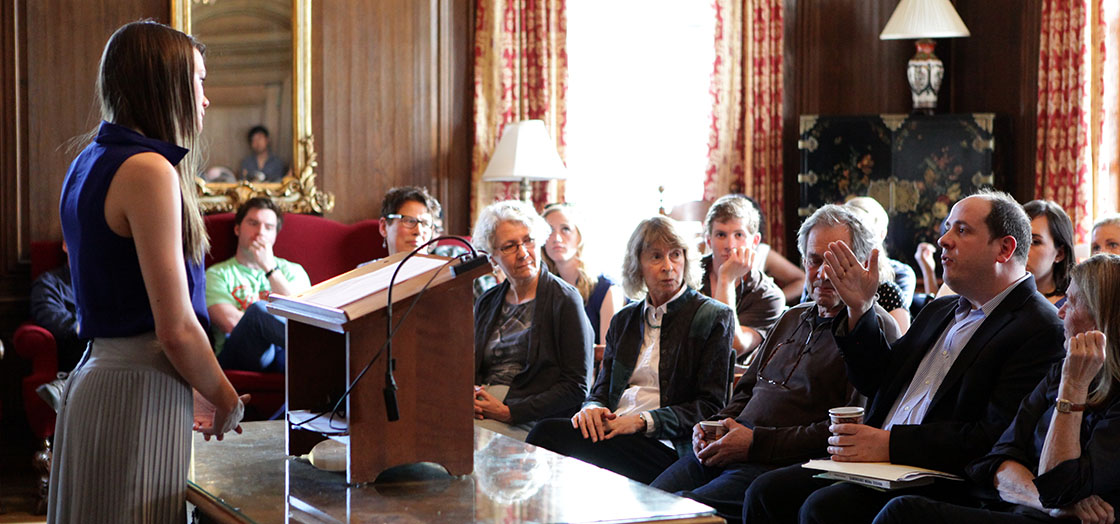

Elizabeth Kelsey
It’s a sunny late April afternoon and Sanborn House’s Wren Room is packed to overflowing as Laura Bryn Sisson ’13 presents her short story collection, Fragile Bodies.
Sisson is an honors student in the English department. Her work, she explains, explores “all that is strange and mysterious to me about reproduction, about family relationships, about the way we see the world, and the way we see our bodies.”
She reads an excerpt from “The Ward,” a story about Winnie, a teenaged girl undergoing inpatient treatment for an eating disorder.
When Sisson finishes reading, the audience applauds, and then the questions begin.
Can you tell us what some of the other fragile bodies are that are in the other stories?
Are they all told in the first-person?
You mentioned how you switched from writing stories about childhood perception of mental illness to more stories about reproduction. Can you talk more about that transition and how you decided to change it?

Asking questions like these teaches students how to listen to professional talks and engage with speakers, say Associate Professors of English and Co-directors of the English Honors Program Monika Otter and Melissa Zeiger. They also let honors students share their work with their peers and receive feedback that will help them develop their craft. “The honors presentations add a sense of public consequence, not to mention drama, to the solitary and sometimes lonely work of researching, planning, and writing a thesis,” Zeiger says. Otter adds that the event is “a chance for the whole department to come together as a scholarly and artistic community.”
Tova Diker ’13 read from her honors thesis, "Beyond the Nose: The Reworking of the Negative Jewish Stereotype in Victorian Literature,” a critical work on the sympathetic Jew in Victorian literature. She had become interested in the subject after reading George Eliot's novel, Daniel Deronda.
“I was really nervous but it was definitely fun,” Diker says of the experience. “I think presenting my work was important because it helped point out where I need more clarification and what points were my strongest,” she adds. “The feedback was great, people were genuinely interested in my presentation, and one specific professor made me think more about the application of theory into my work.”
Sisson’s and Diker’s readings were part of one of four sessions scheduled that week, in which twenty honors students working in creative writing and in literary criticism presented their work. Combining both disciplines at the event is a new and necessary development, says Otter: “We feel that the deep division traditional in so many English departments is obsolete, and that the more the two interrelated fields are in dialogue, the richer the intellectual life of the department.”
To prepare for their time in front of an audience, the presenting students attended a workshop on public speaking given by Josh Compton of the Institute for Writing and Rhetoric, and practiced with Otter and Zeiger. The preparation paid off. Zeiger reports that professors attending this year’s readings “have been impressed with the crisp, focused delivery” they’ve heard.

She adds that learning to give public presentations will help students after college, whether in classrooms or speaking in other public settings. And presenters aren’t the only ones who benefit: “We have found that the presentations are useful to the students in the audience as well, showing them what their colleagues are working on and often inspiring them to undertake their own ambitious projects.”